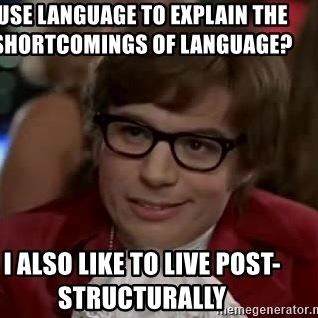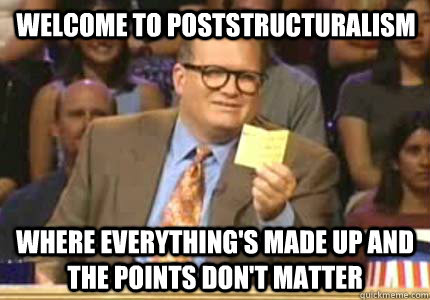Poststructuralism

*This post has been written as part of my journey as a Ph.D student through University of Regina


As you embark on your journey to understand postructuralism and the implications it has on education it must be understood that this paper, and any piece of work on the subject, operates on multiple planes that cannot and will not arrive at any objective or final meaning. Paul (2005) goes as far as stating that, “there is no poststructuralism”. While this particular work strives to align with a set criterion of expectations outlined by the institution, poststructuralists like Deleuze and Guattari reject, “deep, foundational structures intended to provide order, coherence, certainty, and clarity” (Pierre, 2017, p. 1082). Poststructuralism grapples with the ontological viewpoint that language is less perfect at expressing our thoughts and ideas than we might initially think due to both thematic and stylistic uses (Paul, 2005, p. 86). If language as a mode of communication is prone to misrepresentation, or encourages multiple interpretations of the authors’ expression, what does this mean for the practice of analyzing cultural texts within the context of educational research?
As the prefix suggests, poststructuralism follows structuralism and holds roots across a variety of disciplines. While structuralism saw the analysis of cultural texts through systematic inquiry, poststructuralism encourages one to consider that language, as a human convention, is subject to flaws and biases (Pierre, 2017, p. 1082). This failure of language appears to be universally understood despite one’s paradigm orientation and can be seen in common phrases such as, “if you see what I mean”, and “in a manner of speaking”. As researchers dive further into their paradigm it becomes evident that there is a fundamental assumption in the area of defining knowledge. Referred to as epistemology; this asks researchers to reflect on what are sources of knowledge, why is some knowledge perceived to be of higher value than others, and how can knowledge be transferred between individuals (Crotty, 1998). This component is deemphasized within poststructuralism as there is a higher value placed on aesthetics and an understanding that knowledge will be governed by the changing norms across subject areas (Paul, 2005).
With an understanding of, “what is reality,” and “what is knowledge,” researchers are then tasked with determining a methodology that aligns with their established paradigm. Defined by Schwandt (2007, p. 190) as, “the process of how we seek out new knowledge”, methodology can be considered the strategy, plan, or design that underpins one’s methods of knowledge collection. A critique of poststructuralism is the argument that there can be no objective meaning from a data set and, as such, any collection of data, and the subsequent analysis, is briming with multiple interpretations that should be celebrated (Pierre, 2017, p. 1081). While prior paradigms include a techno-rational approach to education that would see the introduction of new concepts change the state of society so that the status quo is now altered, poststructuralism works to undermine this approach in the favour of individual pragmatics (Paul, 2005, p. 47)(Pierre, 2017, p. 1082). The ethics underpinning poststructuralism echos this open journey and is described by Paul (2005, p. 87) as having, “no such congratulatory aim but instead process, a ‘life-working through’ that is also messy… tentative, ambiguous, complex, always multiple, and with elements that are unknown”.
As a means of better understanding poststructuralism Paul (2005) highlights several key terms within their chapter: historicism, linguistic turn, self-reflexive, and postmodernism. Historicism looks at the deep significance that poststructuralists place on history and the influence it has on the social and cultural phenomena. History is seen as having multiple changing interpretations and can be exemplified by how different family members describe a shared experience differently (p. 85). As discussed previously, the linguistic turn refers to the shift from structuralism to poststructuralism which sees language use as, “rhetorical, figurative, performative, and self-reflexive” (p. 86). The ability to be self-reflexive as a poststructuralist requires one to be aware of the influence they have on their own understanding and the way in which literary devices are employed within ones’ work, such as the disclaimer included at the beginning of this piece (p. 87). The last of these terms, postmodernism, has usage across a variety of areas. When discussing poststructuralism, postmodernism refers to the transformational shift in the area of knowledge since of the end of the nineteenth century (p. 85). These terms are echoed, in various capacities, by both Stone and Pierre (2017).
What role does poststructuralism have in the context of educational research? Pierre (2017) argues that the influences on language as a human convention has resulted in a new and unique plane of our own creation, one that requires research to be approached through a concept rather than a methodology. This approach can present challenges, however, as how does one evaluate which qualitative data-collection methodologies to include and which to abandon? Poststructuralism is also subject to criticism as it can be seen as positioning the researcher as more important than the original author and failing to award sufficient respect to the author’s self-communicated intent. This challenge can be seen frequently within human-resources departments who are routinely called in to soothe employee disagreements resulting from a disconnect between language choice, intent, and interpretation between colleagues communicating remotely. The question also remains that, if language as a human convention is inherently flawed at effectively communicating the author’s context, can this summary be seen as an effective analysis of the paradigm?
References
Crotty, M. (1998). The foundations of social research: Meaning and perspective in the research process. SAGE.
Paul, J. (2005). Introduction to the philosophies of research and criticism in education and the social sciences. Pearson Merrill Prentice Hall.
Pierre, E. (2017). Deleuze and Guattari’s language for new empirical inquiry. Educational Philosophy and Theory, 49:11, 1080-1089.